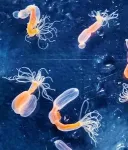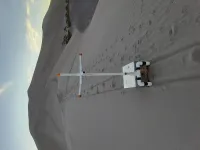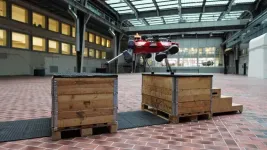(Press-News.org) Annual snow cover days in all major skiing regions are projected to decrease dramatically as a result of climate change, with 1 in 8 ski areas losing all natural snow cover this century under high emission scenarios. These results are published in a new study in the open-access journal PLOS ONE by Veronika Mitterwallner from the University of Bayreuth, Germany and colleagues.
Popular skiing destinations experience the impacts of climate change, which include reduced snowfall in regions around the world. Despite the social, economic, and ecological significance of the skiing industry, little research exists on how ski area distributions are affected by climate change globally. Existing studies are small-scale and focused on Europe, North America, and Australia.
Mitterwallner and colleagues examined the impact of climate change on annual natural snow cover in seven major skiing regions: the European Alps, Andes Mountains, Appalachian Mountains, Australian Alps, Japanese Alps, Southern Alps (located in New Zealand), and Rocky Mountains.
The researchers identified specific skiing locations within these seven regions using OpenStreetMap. As the largest global ski market, the European Alps accounted for 69% of these areas. The researchers also used the public climate database CHELSA, enabling them to predict annual snow cover days for each ski area for 2011-2040, 2041-2070, and 2071-2100 under low, high, and very high carbon emissions scenarios.
Under the high emissions scenario, 13% of ski areas are predicted to lose all natural snow cover by 2071-2100 relative to their historic baselines. Twenty percent will lose more than half of their snow cover days per year. By 2071–2100, average annual snow cover days were predicted to decline most in the Australian Alps (78%) and Southern Alps (51%), followed by the Japanese Alps (50%), Andes (43%), European Alps (42%), and Appalachians (37%), with the Rocky Mountains predicted to experience the least decline at 23% relative to historic baselines.
The researchers state that diminishing snow cover may prompt ski resorts to move or expand into less populated areas, potentially threatening alpine plants and animals already under climate-induced strain. Resorts favoring faux snow may rely on “technical snowmaking” practices like artificial snow production, but regardless, the authors predict that the economic profitability of ski resorts will fall globally.
The authors add: “This study demonstrates significant future losses in natural snow cover of current ski areas worldwide, indicating spatial shifts of ski area distributions, potentially threatening high-elevation ecosystems.”
#####
In your coverage please use this URL to provide access to the freely available article in PLOS ONE: https://journals.plos.org/plosone/article?id=10.1371/journal.pone.0299735
Citation: Mitterwallner V, Steinbauer M, Mathes G, Walentowitz A (2024) Global reduction of snow cover in ski areas under climate change. PLoS ONE 19(3): e0299735. https://doi.org/10.1371/journal.pone.0299735
Author Countries: Germany, Switzerland
Funding: Funded by the Deutsche Forschungsgemeinschaft (DFG, German Research Foundation) – 491183248. Funded by the Open Access Publishing Fund of the University of Bayreuth. The funders had no role in the study design, data collection and analysis, decision to publish, or preparation of the manuscript.
END
The future is likely less skiable, thanks to climate change
Snow scarcity may push popular ski hubs to more remote areas and threaten livelihoods of local populations
2024-03-13
ELSE PRESS RELEASES FROM THIS DATE:
Photo project reveals life with a pet while experiencing homelessness
2024-03-13
In a new study, people experiencing homelessness with a pet documented their lives in photos and participated in interviews, revealing their experiences and potentially informing support initiatives. Gemina Garland-Lewis of the University of Washington, Seattle, and colleagues present this project in the open-access journal PLOS ONE on March 13, 2024.
Having a pet while experiencing homelessness can boost physical and mental health and provide social benefits. However, it can pose unique challenges, such as making it difficult to access medical care, shelters, and other services at facilities ...
The Wim Hof method may reduce inflammation, per systematic review
2024-03-13
The Wim Hof method may produce a beneficial anti-inflammatory response characterized by increased epinephrine levels and a reduction in pro-inflammatory cytokines, according to a systematic review published March 13, 2024 in the open-access journal PLOS ONE by Omar Almahayni and Lucy Hammond from the University of Warwick, UK.
The Wim Hof method is touted by founder and extreme athlete Wim Hof as a practical way to improve physical and mental health. It consists of three pillars—the Wim Hof breathing method, cold therapy, and commitment.
Several studies have assessed the impact of the Wim Hof method on ...
Just one mindfulness and compassion session was associated with reduced symptoms of anxiety, depression and stress a week later, in clinical trial with 91 participants
2024-03-13
Just one mindfulness and compassion session was associated with reduced symptoms of anxiety, depression and stress a week later, in clinical trial with 91 participants
###
Article URL: https://journals.plos.org/plosone/article?id=10.1371/journal.pone.0299300
Article Title: Efficacy of a single session mindfulness based intervention: A randomized clinical trial
Author Countries: USA
Funding: The authors received no specific funding for this work. END ...
Interactions with dogs can increase brainwaves associated with stress relief and heightened concentration
2024-03-13
Spending quality time with dogs reduces stress and increases the power of brain waves associated with relaxation and concentration, according to a study published on March 13, 2024 in the open-access journal PLOS ONE by Onyoo Yoo from Konkuk University, South Korea, and colleagues.
Animal-assisted interventions, like canine therapy, are widely used in hospitals, schools, and beyond to help reduce anxiety, relieve stress, and foster feelings of trust. Studies of the potential benefits of animal interactions often take a holistic approach, comparing people’s mood or hormone levels before and after spending time with a service animal. But this approach doesn’t ...
Climate change has significantly increased crop water demand in the San Joaquin Valley, and the shift since 2011 is a volume of water the size of a major reservoir
2024-03-13
Climate change has significantly increased crop water demand in the San Joaquin Valley, and the shift since 2011 is a volume of water the size of a major reservoir.
####
Article URL: https://journals.plos.org/water/article?id=10.1371/journal.pwat.0000184
Article Title: An invisible water surcharge: Climate warming increases crop water demand in the San Joaquin Valley’s groundwater-dependent irrigated agriculture
Author Countries: United States
Funding: This work was supported by the United States Department of Agriculture (USDA) ...
Being in therapy prior to COVID-19 pandemic prevented anxiety uptick during its peak
2024-03-13
Researchers compared levels of anxiety among psychotherapy outpatients based on whether they initiated therapy before, during or after the onset of COVID-19 pandemic
Authors say findings suggest that cognitive behavioral therapy (CBT) and dialectical behavior therapy (DBT) can provide tools to help individuals manage anxiety in the face of major world events and upheaval
Belmont, Mass. – (March 13, 2024) The start of the COVID-19 pandemic led to unprecedented exposure to stressors driven by fears of a novel and deadly disease, intense uncertainty, and resulting ...
Crucial insights into animal defense mechanisms and tradeoffs revealed
2024-03-13
New study reveals insights into predator-prey dynamics in the animal kingdom, focusing on sea anemones. The surprising discovery of a native anemone population lacking the Nv1 neurotoxin led to an investigation into its impact on defending against grass shrimp, a native predator. Anemones without Nv1 showed weakened defensive abilities, while the neurotoxin, when present, attracted mummichog fish, natural predators of grass shrimp. This research enhances our understanding of marine ecosystems and the intricate balance of predator-prey interactions and tradeoffs.
A new ...
Drug design at the atomic level to thwart COVID-19
2024-03-13
Although COVID-19 has faded from the headlines, SARS-CoV-2 – the coronavirus behind the pandemic – is still rampantly infecting people around the world. Public health officials fear as the virus continues to evolve, it will eventually hit upon a diabolical mutation that renders current treatments ineffective, triggering a new wave of severe infection and social disruption.
In pursuit of new therapies to avoid this dark fate, researchers at Stanford have now unveiled a compound that measures up as a potentially powerful anti-coronavirus drug, detailed in a paper published March 13 in Science Translational Medicine. ...
SwRI receives $2 million NASA grant to develop lunar-regolith-measuring instrument
2024-03-13
SAN ANTONIO — March 13, 2024 —Southwest Research Institute (SwRI) has been awarded a three-year, $2,041,000 grant from NASA’s Development and Advancement of Lunar Instrumentation (DALI) program to further develop a novel ground-penetrating radar instrument. The Synthetic Pulse Artemis Radar for Crustal Imaging (SPARCI, pronounced “sparky”) instrument is designed to characterize the depth of the regolith and upper megaregolith, the upper broken-up layers of lunar crust associated with ...
ANYmal can do parkour and walk across rubble
2024-03-13
ANYmal has for some time had no problem coping with the stony terrain of Swiss hiking trails. Now researchers at ETH Zurich have taught this quadrupedal robot some new skills: it is proving rather adept at parkour, a sport based on using athletic manoeuvres to smoothly negotiate obstacles in an urban environment, which has become very popular. ANYmal is also proficient at dealing with the tricky terrain commonly found on building sites or in disaster areas.
To teach ANYmal these new skills, two teams, both from the group led by ETH Professor Marco Hutter of the Department of Mechanical and Process Engineering, followed different approaches.
Exhausting the mechanical options
Working ...
LAST 30 PRESS RELEASES:
Medicare patients get different stroke care depending on plan, analysis reveals
Polyploidy-induced senescence may drive aging, tissue repair, and cancer risk
Study shows that treating patients with lifestyle medicine may help reduce clinician burnout
Experimental and numerical framework for acoustic streaming prediction in mid-air phased arrays
Ancestral motif enables broad DNA binding by NIN, a master regulator of rhizobial symbiosis
Macrophage immune cells need constant reminders to retain memories of prior infections
Ultra-endurance running may accelerate aging and breakdown of red blood cells
Ancient mind-body practice proven to lower blood pressure in clinical trial
SwRI to create advanced Product Lifecycle Management system for the Air Force
Natural selection operates on multiple levels, comprehensive review of scientific studies shows
Developing a national research program on liquid metals for fusion
AI-powered ECG could help guide lifelong heart monitoring for patients with repaired tetralogy of fallot
Global shark bites return to average in 2025, with a smaller proportion in the United States
Millions are unaware of heart risks that don’t start in the heart
What freezing plants in blocks of ice can tell us about the future of Svalbard’s plant communities
A new vascularized tissueoid-on-a-chip model for liver regeneration and transplant rejection
Augmented reality menus may help restaurants attract more customers, improve brand perceptions
Power grids to epidemics: study shows small patterns trigger systemic failures
Computational insights into the interactions of andrographolide derivative SRJ09 with histone deacetylase for the management of beta thalassemia
A genetic brake that forms our muscles
CHEST announces first class of certified critical care advanced practice providers awarded CCAPP Designation
Jeonbuk National University researchers develop an innovative prussian-blue based electrode for effective and efficient cesium removal
Self-organization of cell-sized chiral rotating actin rings driven by a chiral myosin
Report: US history polarizes generations, but has potential to unite
Tiny bubbles, big breakthrough: Cracking cancer’s “fortress”
A biological material that becomes stronger when wet could replace plastics
Glacial feast: Seals caught closer to glaciers had fuller stomachs
Get the picture? High-tech, low-cost lens focuses on global consumer markets
Antimicrobial resistance in foodborne bacteria remains a public health concern in Europe
Safer batteries for storing energy at massive scale
[Press-News.org] The future is likely less skiable, thanks to climate changeSnow scarcity may push popular ski hubs to more remote areas and threaten livelihoods of local populations










